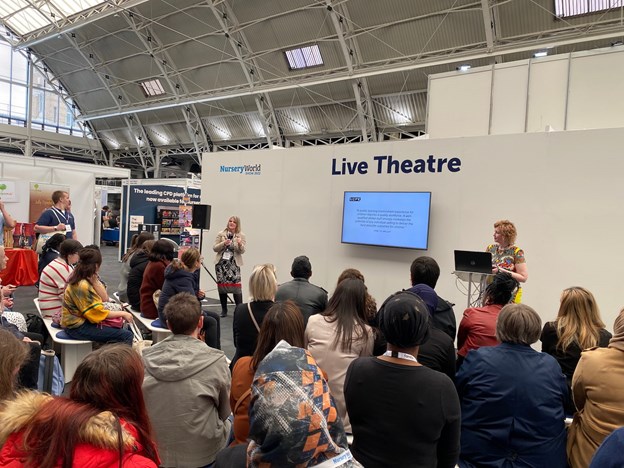Claim learners’ certificates by Friday 11 July. If your qualification doesn’t include an external assessment and learners are expecting results in August, make sure to claim certificates by this date. For qualifications with external assessments, claim within two working days of receiving confirmed results. Find out more on our timely delivery of results page.
3 key takeaways: Implications for the future early years workforce
The Nursery World Show explores some of the biggest questions facing the early years sector. For example, how can we inspire healthy development in children? Or what is the latest guidance from Ofsted and how will this impact practitioners?
We hosted a workshop at this year’s event examining another of the sector’s most topical questions – what will the future early years workforce look like? Presented by our Sector Manager for Education and Childcare, Janet King, and our CACHE Alumni Communities Manager, Dawn Newman, the session looked at some of the biggest changes likely to impact the sector over the coming years and the ways in which these will shape the future workforce.
Read on to catch up on our 3 key takeaways from the workshop:
1. New pathways into the workforce will have an impact
One of the biggest influences on the future early years workforce will undoubtedly be the new and exciting pathways to enter the sector. In September 2020, the education and childcare T Level was launched to the first cohort of students. Developed in close consultation with business and current practitioners, the T Level opens up a wide range of opportunities upon completion including direct employment, higher or degree-level apprenticeships, and higher-level education (including university).
T Levels play an important role in equipping the future early years workforce with the skills they’ll need, and the unique T Level industry placements will give students crucial real-world experience during their programme.
This substantial experience will help to ensure the future early years workforce feels ready and prepared with both the sector-relevant and essential skills that they’ll need to succeed in the workplace.

Janet King (left) and Dawn Newman (right) present their workshop at Nursery World Show 2022
2. Knowledge and experience must be shared
As with many sectors, the value of learning from the knowledge and advice shared by those with early years experience cannot be understated. Leaning into the community for information and guidance is key to building a sustainable and supported workforce that can then grow and develop to reach their full potential. It’s also true that seasoned practitioners can benefit greatly from new perspectives and the knowledge shared in conversation by those currently studying or newly qualified.
That is why we’re so proud of the growing CACHE Alumni network, which supports practitioners, learners, employers and educators within the care, health and education sectors. By joining for free, individuals have access to learning materials such as articles, e-learning, expert advice, and can even benefit from member discounts.
The CACHE Alumni community is currently made up of over 18,000 members and has already provided more than 300 careers support interventions this year, alongside providing opportunities for members to network and share their experiences in professional discussion. We really believe that being part of such a network is key to shaping an informed and supported future workforce.
On placement, I truly feel like part of the school community. I’ve also developed key skills such as creating activity/lesson plans, learning to adapt, and thinking quickly on my feet.
3. Sustainability will be a key feature
There is no doubt that sustainability will be a growing feature as the early years workforce continues to evolve. It will be a bigger focus to early years practitioners’ roles in the coming years, and threading sustainable practices throughout early years’ learning, training and resources will be a priority.
In fact, Janet King recently spoke about the vital nature of embedding education for sustainability into all aspects of early childhood and we’ve already begun producing resources that will help to aid the sector. Our comprehensive award-winning Early Childhood Education for Sustainability resource demonstrates how sustainability and STEM (science, technology, engineering and maths) can be woven into early years experiences for young children, and there are a number of CACHE Alumni articles which provide case studies, activities and practical tips for making sustainability practice sustainable.
The CACHE Alumni community also held a recent online event entitled “Sustainability for practitioners” for practitioners looking to learn about, and implement, sustainable practices. Judging by the increase in resources available, it seems certain that the future early years workforce will be well supported in their green thinking and practices.
To keep up to date with the latest news and opportunities from the early years sector, you can visit our Early Years and Childcare homepage.
I enjoyed the opportunities the T Level has given me – for example the placements, learning from experience, and being able to reflect on my experiences. The staff have been so valuable, as they have shared so much.

How we’re supporting practitioners to embed sustainability into early years
NCFE’s Sector Manager for Education and Childcare explains how our new early childhood education for sustainability resource will help practitioners to make sustainability a central part of their practice.
Read more
6 key takeaways for practitioners looking to embed sustainability and green thinking
Here we share 6 key takeaways from our thought-provoking CACHE Alumni online event “Sustainability for practitioners”.
Read more
T Level students from Thorpe St Andrew School and Sixth Form set their sights on university
We speak to Education and Childcare T Level students Kate Campbell and Ellie Hearn to learn more about how this qualification has helped them to get one step closer to their career goals.
Read more
